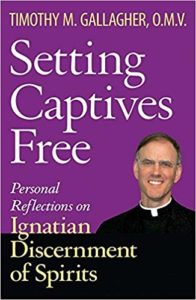Podcast: Play in new window | Download (Duration: 51:19 — 35.3MB) | Embed
Subscribe: Apple Podcasts | Spotify | Amazon Music | Android | Pandora | iHeartRadio | JioSaavn | Podchaser | Gaana | Podcast Index | Email | TuneIn | Deezer | Anghami | RSS | More

The Journey Through the Dark Night – Spiritual Desolation: Be Aware, Understand, Take Action with Fr. Timothy Gallagher
Fr. Timothy Gallagher clarifies the difference between spiritual desolation and the “dark night” of St. John of the Cross. Spiritual desolation is the enemy’s discouraging pull away from prayer and hope; the right move is to resist it. The dark night, by contrast, is God’s painful but purifying gift within prayer that prepares a person for deeper union—first at the level of the senses, later at the level of the spirit, each with active cooperation on our part but primarily God’s work. Think “too much light” rather than darkness: the soul isn’t yet ready, so the brightness stings until it adjusts. Mother Teresa’s long interior darkness is presented as a classic dark night permitted for her sanctification and, in time, for others’ good. While “dark night” is often used broadly—as by Flannery O’Connor, Gerald May, John Paul II, and in popular speech—discerning its technical meaning requires using the term the way John of the Cross does.
Practically: everyone encounters spiritual desolation; not everyone is led into the dark night. Don’t be quick to label a rough patch a dark night; look for its context—usually a transition from more active prayer to a simpler, receptive communion. Doubts can mean very different things: some are part of ordinary faith, some are the enemy’s discouragement (reject them), and some arise amid a true dark night (endure them with guidance). Wise spiritual accompaniment helps a person tell these apart, just as St. Ignatius himself learned discernment over time. Our task is to be faithful—regular prayer, sacraments, spiritual reading, and steady self-gift—while God, the protagonist, gives growth and fruit in due season. Paths vary, as Therese’s “many flowers” image shows; our part is to keep showing up and let God lead.
Discerning Hearts Reflection Questions:
- When have I felt discouragement in prayer, and did I treat it as an attack to resist or a grace to receive?
- How is my current prayer more active effort or more quiet receptivity before God?
- Do I have a wise spiritual guide to help me distinguish desolation from a true dark night?
- Where do I notice “too much light” in prayer that feels painful because I’m not yet ready to receive it?
- What simple, faithful practices (Mass, confession, Scripture, Rosary) anchor me when feelings fade?
- Am I quick to label difficulties as a dark night instead of patiently discerning their source?
- How is God inviting me to “make space” by letting go of attachments that dull my receptivity?
- In seasons of dryness, do I keep showing up to pray out of love rather than consolations?
- What desires for holiness arise in me when I ponder the saints, and how will I act on them this week?
- Where do doubts in me come from—honest seeking, enemy discouragement, or purifying growth in prayer?

From Setting the Captives Free: Personal Reflections on Ignatian Discernment of Spirits
“The dark night, therefore, is an experience of infused contemplative prayer felt as painful because it is purifying; it prepares the person for greater union with God through higher states of infused contemplation. The difference between this purifying experience of prayer and the discouraging lies of spiritual desolation is evident. The first is a gift of God; the second is a trap of the enemy. By accepting the first, we grow; by rejecting the second, we grow.”
Father Timothy M. Gallagher, O.M.V., was ordained in 1979 as a member of the Oblates of the Virgin Mary, a religious community dedicated to retreats and spiritual formation according to the Spiritual Exercises of St. Ignatius. Fr. Gallagher is featured on the EWTN series “Living the Discerning Life: The Spiritual Teachings of St. Ignatius of Loyola”. For more information on how to obtain copies of Fr. Gallaghers’s various books and audio which are available for purchase, please visit his website: frtimothygallagher.org


